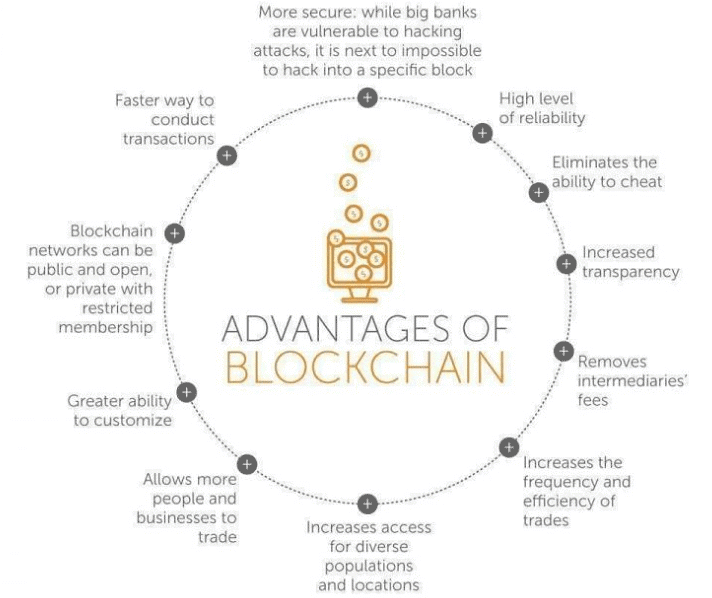Blockchain Technology | Science & Technology for UPSC CSE PDF Download
| Table of contents |

|
| Introduction |

|
| Operation of Blockchains |

|
| Prospects of Blockchain Technology |

|
| Challenges of Blockchain Technology |

|
| Blockchain in Social Sectors |

|
| The Way Forward for Blockchain |

|
Introduction
Blockchains are a novel data structure characterized by security, cryptography-based principles, and distribution across a network. This technology underpins cryptocurrencies like Bitcoin and facilitates the secure transfer of digital assets and data.
Operation of Blockchains
Blockchains enable transactions that are simultaneously anonymous and secure, conducted peer-to-peer, instant, and frictionless. They achieve this by distributing trust from centralized authorities to a global network, using collaborative efforts, code, and cryptography to maintain an immutable public ledger of all network transactions. Key components include:
- Blocks: Blocks represent the current set of recent transactions and become permanent records in the blockchain once completed.
- Chain of Blocks: Each block is linked to the previous one in chronological order, forming a secure chain with every block containing a hash of its predecessor.

Prospects of Blockchain Technology
Blockchains have diverse applications across industries, including:
- Healthcare: Improving health data management and reducing insurance claim fraud.
- Banking: Enhancing security and fraud prevention in financial transactions.
- Education: Securely managing credentials and certifications.
- Agriculture: Ensuring transparency and reducing food fraud.
- Electricity Distribution: Optimizing energy supply chains.
- Land Records: Securely managing property rights and land data.
- Smart Contracts: Automating and securing contract execution.
- Artificial Intelligence and IoT: Facilitating real-time transactions among IoT devices.
Challenges of Blockchain Technology
Despite its potential, blockchain technology faces challenges, including:
- Initial Costs: Implementing blockchain can be expensive.
- Energy Consumption: Blockchain networks consume significant energy.
- Privacy Concerns: Balancing transparency with individual and company privacy.
- Limited Awareness: Many individuals and organizations lack knowledge of distributed ledger technology benefits.
- Complexity: Managing automated risk management and smart contracts can lead to complex obligations.
Blockchain in Social Sectors
Blockchain can bring transformative changes to various social sectors:
- Personal Identification: Secure management of personal data, certificates, and identification records.
- Corruption Prevention: Transparency in government transactions and procurement.
- Reduction of Bureaucracy: Streamlining data sharing between government agencies.
- Identity and Land Rights: Securing property rights and identity information.
- Agriculture: Enhancing food supply chain transparency and efficiency.
- Health: Improving healthcare record management and pharmaceutical supply chains.
- Governance and Democracy: Enhancing democratic processes and secure online voting.
- Environmental Protection: Tracking product origins and certifications.
- Philanthropy and Aid: Ensuring transparency in aid distribution.
- Crowdfunding: Using blockchain for cryptocurrency-based crowdfunding.
The Way Forward for Blockchain
To harness the potential of blockchain technology:
- Address Vulnerabilities: Identify and mitigate blockchain vulnerabilities.
- Data Repository: Establish a robust data repository before implementing blockchain in the public sector.
- Integration with Aadhar: Link IndiaChain with Aadhar for secure personal identity.
- Regulations: Develop appropriate regulations for blockchain technology use.
- Privacy Protection: Address data privacy concerns.
- Leverage Technical Talent: Utilize India's technical talent pool to lead in blockchain innovation.
|
146 videos|358 docs|249 tests
|
FAQs on Blockchain Technology - Science & Technology for UPSC CSE
| 1. What is the operation of blockchains? |  |
| 2. What are the prospects of blockchain technology? |  |
| 3. What are the challenges of blockchain technology? |  |
| 4. How can blockchain technology be applied in social sectors? |  |
| 5. What is the way forward for blockchain technology? |  |
|
146 videos|358 docs|249 tests
|

|
Explore Courses for UPSC exam
|

|


















